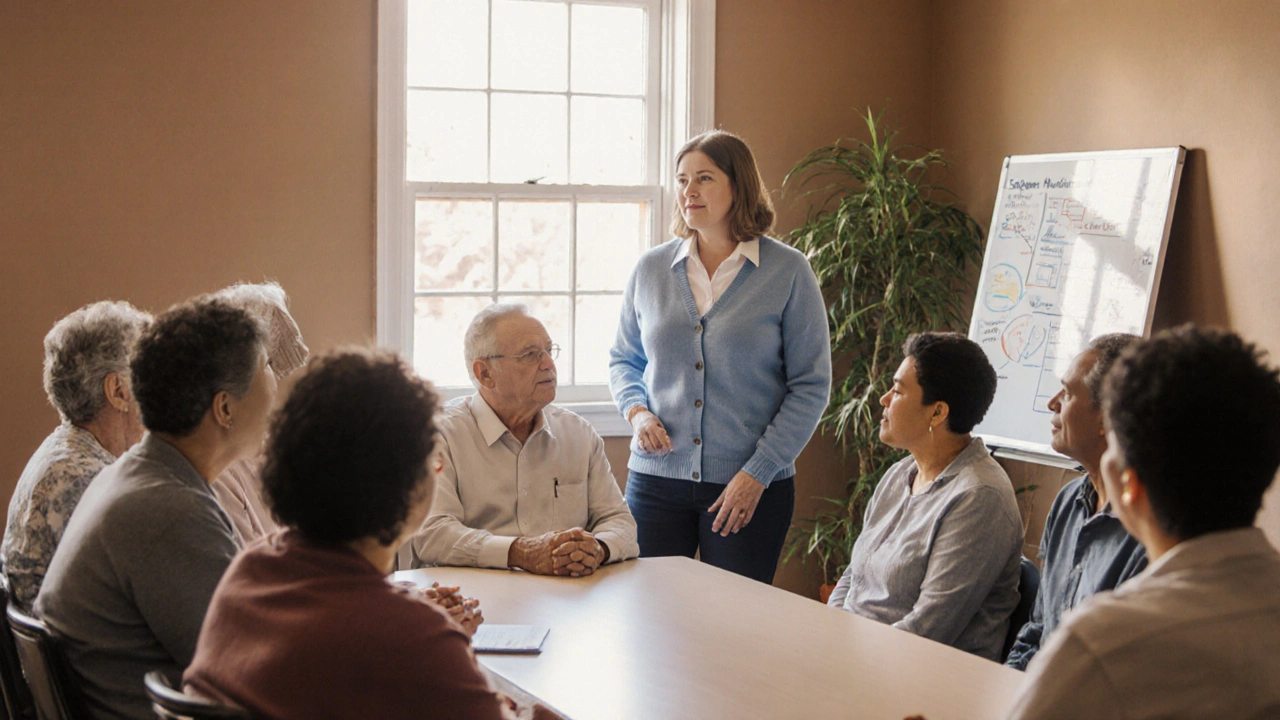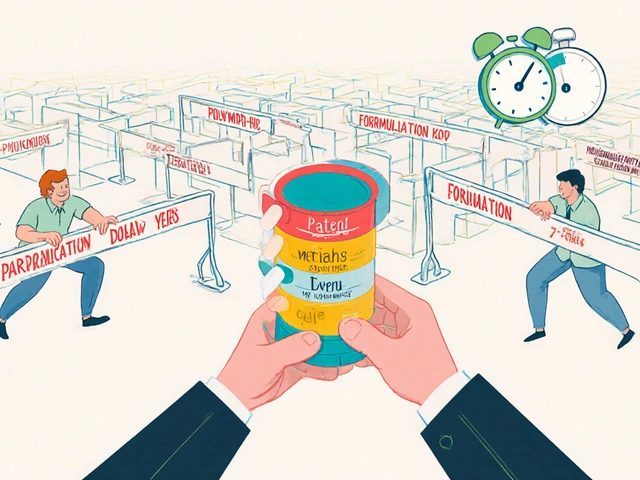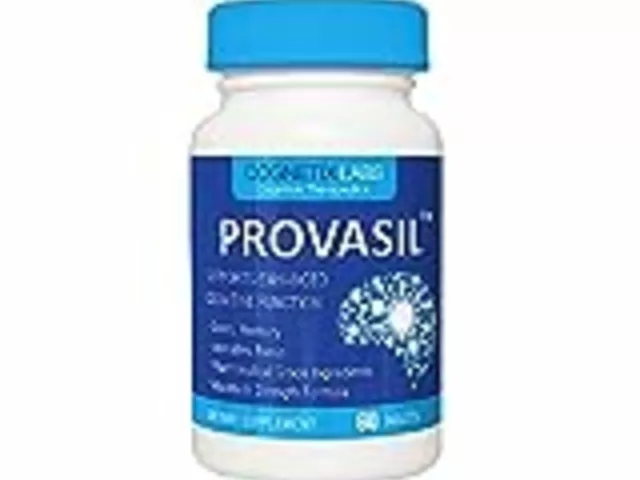COPD Support Group Finder
This tool helps you identify the COPD support group type that best matches your needs based on your mobility, social preferences, and daily challenges.
Quick Summary
- Support groups give COPD patients education, emotional backing, and practical tips that boost daily functioning.
- Both in‑person and online formats work, but each has unique strengths.
- Choosing the right group involves checking facilitator credentials, meeting frequency, and peer compatibility.
- Active participation-setting personal goals, sharing experiences, and asking questions-maximises benefits.
- Avoid common traps like relying on unverified advice or neglecting medical guidance.
When living with chronic obstructive pulmonary disease (COPD), you quickly discover that medical treatment is just one piece of the puzzle. The rest comes from everyday choices, emotional resilience, and the people you lean on. That’s where COPD support groups step in-creating a community that turns isolated struggle into shared strength.
What Are COPD Support Groups?
A COPD support group is a gathering-usually regular and either face‑to‑face or virtual-where people affected by COPD exchange experiences, information, and encouragement. The groups are often led by a healthcare provider (pulmonologist, nurse, or respiratory therapist) or a trained facilitator who keeps discussions on track and ensures information is accurate.
These groups differ from formal pulmonary rehabilitation programs. While rehab focuses on structured exercise and breathing techniques, support groups add a social layer: they tackle anxiety, depression, smoking cravings, and day‑to‑day coping strategies.
How Support Groups Influence COPD Management
Research from the Australian Lung Foundation (2023) found that patients active in peer groups reported a 15‑20% improvement in lung function (measured by spirometry) stability over 12 months, compared with those who relied solely on clinic visits. The boost comes from several intertwined mechanisms:
- Education: Members share up‑to‑date advice on inhaler technique, recognizing exacerbation signs, and navigating Medicare benefits.
- Emotional support: Talking about fear of breathlessness lowers anxiety levels, which in turn reduces the physiological stress that can worsen airway inflammation.
- Behavioral reinforcement: Seeing peers succeed with smoking cessation programs motivates others to stay smoke‑free.
- Adherence encouragement: Group reminders about medication schedules and regular check‑ups improve compliance.
- Problem‑solving: Members swap practical tips-like how to manage humidifier use in winter or negotiate workplace accommodations.

Types of Support Groups & When to Choose Each
| Feature | In‑Person | Online |
|---|---|---|
| Social Interaction | High - face‑to‑face bonding, body language cues | Moderate - video chat, chat rooms, emojis |
| Accessibility | Requires travel; may be hard for severe breathlessness | Can join from home; useful for rural patients |
| Facilitator Presence | Often a qualified healthcare provider on site | May be peer‑led; professional input via scheduled webinars |
| Resource Sharing | Printed handouts, live demos of inhaler use | Digital files, links to reputable sites (e.g., Lung Foundation) |
| Cost | Often free but may have venue fees | Usually free; occasional subscription for premium platforms |
If you have reliable internet and limited mobility, an online group can deliver most benefits without the travel strain. Conversely, if you thrive on physical connection and want live demonstrations, an in‑person meeting is worth the effort.
Finding the Right Group for You
Start with the following steps:
- Ask your pulmonologist or respiratory nurse-most clinics keep a list of local groups.
- Check community health‑center bulletin boards; many host monthly gatherings.
- Search national bodies such as the Australian Lung Foundation or COPD Australia; they maintain online directories.
- Explore reputable platforms like COPD Community Hub or the National COPD Forum for virtual meetings.
- Ask a trusted caregiver - they often know which groups are truly supportive.
When you locate a candidate, evaluate it with these quick questions:
- Are meetings facilitated by a qualified healthcare provider or a recognized peer‑leader?
- Is the group size manageable (10‑15 participants) so each voice gets heard?
- Does the agenda include education, open discussion, and opportunity for personal goal‑setting?
- Do members respect medical advice and avoid sharing unverified “cures”?
Making the Most of Your Group
Active participation is the secret sauce. Here are proven tactics:
- Set a personal agenda. Before each meeting, write down one question or goal (e.g., “How can I adjust my inhaler during cold weather?”).
- Share, but stay concise. Brief stories keep the session flowing and make room for multiple voices.
- Take notes. Jotting down tips on pulmonary rehabilitation exercises helps you remember and apply them later.
- Pair up. Find a “support buddy” to check in between meetings-this strengthens accountability.
- Ask for resources. Request reputable pamphlets or links; a well‑run group will provide materials from recognized bodies like the National Health and Medical Research Council.
If you’re shy about speaking, consider starting by responding to a facilitator’s prompt or posting a question in the group chat before the next live session.

Success Stories & Evidence
In 2022 a Melbourne‑based support group partnered with a local hospital’s rehab team. Over 18 months, participants showed:
- 10% reduction in emergency department visits for COPD exacerbations.
- Average 4‑point increase on the St George’s Respiratory Questionnaire (better quality of life).
- Higher adherence to vaccination schedules (influenza and pneumococcal).
These outcomes echo the findings of a 2021 multicentre study across Australia and New Zealand, where peer support added an average of 3.5 extra medication‑free days per month.
Common Pitfalls & How to Avoid Them
Even a great group can backfire if you fall into these traps:
- Relying on anecdotal advice. Always double‑check any new treatment idea with your clinician.
- Skipping professional input. A group without a trained facilitator may drift toward misinformation.
- Over‑committing. Attending every session when you’re exhausted can increase stress; pick a frequency that matches your energy.
- Isolating yourself. If you hear negative talk (“I quit because I’m hopeless”), gently steer the conversation toward solutions.
Apply a simple rule: if something feels too good to be true, run it by your doctor before acting.
Next Steps & Resources
Ready to give a support group a try? Here’s a quick launch checklist:
- Write down your top 2 COPD‑related challenges (e.g., breathlessness during stairs, quitting smoking).
- Contact your clinic’s respiratory therapist and ask for a list of local groups.
- Pick one in‑person or online option that fits your schedule.
- Prepare a brief intro: name, how long you’ve lived with COPD, and what you hope to learn.
- Attend the first meeting with an open mind and a notebook.
For further reading, consider these reputable sources (available free of charge):
- Australian Lung Foundation - COPD management toolkit.
- National Health and Medical Research Council - Guidelines on chronic lung disease.
- Breathless? - A peer‑run blog that curates evidence‑based articles.
Frequently Asked Questions
Do I need a doctor’s referral to join a COPD support group?
No formal referral is usually required. However, asking your clinician can help you find groups that align with your treatment plan and ensure the facilitator has relevant expertise.
Are online support groups safe for sharing personal health information?
Choose platforms that use encrypted video calls and have clear privacy policies. Never share full medical records; discuss symptoms in general terms and follow up with your doctor for specifics.
How often should I attend a support group?
Most groups meet weekly or bi‑weekly. Start with the recommended frequency, then adjust based on how you feel. Consistency matters more than intensity.
Can support groups help me quit smoking?
Yes. Groups often incorporate proven cessation tools-like nicotine replacement therapy discussions, behavioural coaching, and peer accountability. Success rates improve when the group is linked to a professional cessation program.
What should I do if the group shares advice that contradicts my doctor?
Always verify with your healthcare provider first. Respectful dialogue is key; you can bring the conflicting advice to your next appointment and ask for clarification.







October 12, 2025 AT 18:09
This tool is rad, definetly a game‑changer!